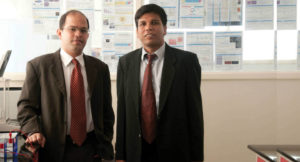Krishnan ganesh, chairman, portea medical, urges entrepreneurs to understand the finer nuances of scaling up an organisation across multiple dimensions.
POORNIMA KAVLEKAR
Krishnan Ganesh needs no introduction in the startup world! Nevertheless, I’ll do my best. A serial entrepreneur and an angel investor, Ganesh’s entrepreneurial experience is filled with some wonderful lessons that can inspire any budding entrepreneur. The way he grew Tutor Vista and ultimately sold it to Pearson and his vision for his current ventures such as Portea Medical and Bigbasket.com indicate his ability to solve a pain point for the consumer. Drawing key lessons from his journey, in this talk, he helps an entrepreneur understand the nuances of scaling up.
What do you want to scale?
The first step towards scaling and growing is to know what one is trying to do. “You need to choose the game you are going to play, what is the level playing field and do you have the skills required to be in the field,” says Ganesh. One of the most important things about scaling is what one wants to scale and when. Is it going to be the revenue, profitability, market share, growth rate or gross margin? Once this is determined, the focus will depend a lot on the objective of the organisation and the stage at which the company is – is it reaching break even, seeking funding and so on. “Once you have narrowed this down, your single biggest focus has to be on cash. Companies have never shut down because its valuation is low but have shutdown as they run out of cash when scaling,” says he.
Ganesh is bullish about the opportunities in India. “Whether it is Portea, Big basket, Bluestone, Homelane, or Freshmenu, these companies are addressing basic core needs in India and are about less than 2-3 years old in India,” says he. He comments that India is a large market and urges the entrepreneurs to pick a big sector which caters to roti, kapda, makhan, healthcare, education or entertainment, as each one of these sectors is huge and gives entrepreneurs opportunities to scale. If one is able to get rid of pain points in these sectors, then the scope to build is large. However, there has to be a level playing field. For example, if we are talking about scaling up a business in Silicon Valley, then it is a very tough game. The US is an evolved economy and one has to be a genius to start a business there as so many problems have already been solved.
“In India, I don’t need to think so much. You can take grocery, bread or milk and deliver it home. Take for example, Bigbasket; We started it three and half years back and it is currently valued at US $400 million dollars,” says Ganesh. He is just in the process of closing a series B funding for Portea Medical (closed since this talk; Portea raised US $37.5 million in Series-B from Accel, IFC and others), which is a company that offers quality healthcare at home.
Brand power
“Indians are hungry for brands. They are aspirational, especially in Tier 2 and 3 cities. They see the same video, channels and the aspiration to own that brand is there. But, the reach is not there,” states he. All the big chains are in the major metros and cities. “They have more money and time to spend. They don’t have distraction. The biggest hunger for education in TutorVista in India was from Tier 2 and 3 towns,” shares Ganesh.
One of the most important things about scaling is what one wants to scale and when. Is it going to be the revenue, profitability, market share, growth rate or gross margin?
So, one can build a brand to address this gap. And the cost and time to build a brand has come down drastically, thanks for the digital world. In Portea, other than brand building exercise that it has started now, the entire one year budget of Rs. 10 crore was on social media to generate sales. It focused on facilitating bookings over a mobile phone, and the idea was to reach customers in a social/mobile world.
The time taken to create a brand is also quicker today than what it would have taken 10 years back. But along with it comes the fact that today’s consumer also have a very short attention span and are very distracted and need to be continuously engaged.
At the right pace
Scaling up too fast or too slow are some mistakes entrepreneurs make. One of the important things is to catch the growth wave right. Today, there is a lot of foreign money coming in and people start scaling too fast without getting the basic metrics right. “There has to be a method to the scaling madness and for that to happen, scale multiple things – users, revenue, technology, people, processes and so on,” says Ganesh. And this is possible only if the management identifies friction items hampering the scale up of the business. “In Tutor Vista, hiring teachers was a major issue. How do we train a 50 years old Indian teacher to train American students online at 2AM?So, most of the businesses, depending on the model, will have a similar issue to tackle,” says he.
To conclude, to scale, dream big. Have an ambition to be the category leader and do whatever it takes to reach there. Building a brand and scaling it is tough and a long journey, irrespective of the size of the brand. Many times start-ups don’t have an ecosystem. “Create it.” urges Ganesh. Take the case of Homelane. The whole concept of doing kitchens cabinets was completely disorganised. The company organised it, built a virtual reality software, so that people can experience it. “Doing things that’s never been done before is important to scale,” concludes Ganesh.
KEY TAKEWAYS
To scale, dream big.
Build a brand to address the gap seen in the market; In the process, create an ecosystem if needed
Identify what you want to scale – revenue, profitability, market share, growth rate or gross margin
Scale up at the right pace – identify the friction items hampering the scale up




